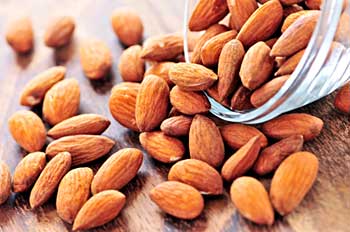More Health and Nutrition Bites
Related
Pistachio Nuts Improve Cholesterol
Turkey is a Mediterranean country, and as such The Mediterranean Diet is common there. Researchers in Turkey noted that pistachio nuts are popular in areas from western Asia to Afghanistan and beyond, so they chose to focus their research on nut consumption and cholesterol on pistachios.
Nuts and Heart Disease & Diabetes
We know that the spike in blood glucose levels caused by eating appears to cause a spike in cell oxidants, which can damage your body's good cholesterol, your DNA, and the proteins in your bloodstream. Recently the glycemic index has received a lot of attention because a low glycemic index meal causes less of a spike in blood glucose levels - and therefore the spike in cell oxidants.
Walnuts and Type 2 Diabetes
For those people who are savory snackers, nuts should be your first choice of snack. (If you are a sweet snacker, fruit should be your first choice.) While I would prefer that people eat their nuts raw and unsalted, roasted and salted are also great and are certainly much better for you than Doritos.
Health & Nutrition Bites
Get the latest health and diet news - along with what you can do about it - sent to your Inbox once a week. Get Dr. Gourmet's Health and Nutrition Bites sent to you via email. Sign up now!
Nuts and your risk of dying from cancer or heart disease

Over the years we've written Health & Nutrition Bites on nearly a dozen peer-reviewed studies that focus on nuts and their impact on all sorts of conditions, including poor cholesterol scores, cancer, and type 2 diabetes. This doesn't include those articles written about a Mediterranean-style diet, which includes nuts as one of its nine dietary components.
An international team of scientists, including representatives from Italy, Poland, and the United States, recently pooled the data from multiple prospective studies to look at the effects of nut consumption on the risk of death from all causes or specifically cancer or heart disease (Am J Clin Nutr 2015;101:783-93). Prospective studies are considered far more meaningful than cross-sectional studies, as prospective studies follow participants from one point in time to another, while cross-sectional studies look at a single snapshot in time.
The authors of today's research found 7 prospective studies that looked at all-cause mortality, 6 that looked at risk of death from heart disease, and 2 that looked at risk of death from cancer. In pooling the data from these studies, the effective total number of participants was over 350,000 people.
After analysis, they found that consuming a single serving of nuts per week reduced participants' risk of dying from heart disease by 7% and from all causes by 4%. A serving of nuts per day further reduced their risk of dying from heart disease by 49% and from all causes by 27%. Cancer risk decreased by 14% only when the researchers compared those who ate the most nuts (one or more servings per day) with those who ate the least (less than 1 serving per week or none at all).
There are two caveats here: first, this research shows an association between eating nuts and a lower risk of death from certain causes - it does not prove that eating more nuts is the cause of that reduction in risk. The authors note, further, that those participants who ate more nuts also tended to eat more fruits and vegetables, have a lower Body Mass Index, and were less likely to smoke than those who ate fewer nuts.
What this means for you
This is simply another reason for you to choose nuts - whatever your favorite kind is - as a snack, as a topping for cereals, or added to recipes for texture and flavor. I tell my patients that while raw, unsalted nuts would be my first choice, dry roasted and salted are fine if you don't have to worry about your sodium intake and you just don't like raw nuts. Candied nuts are best avoided as snacks.
First posted: April 15, 2015
